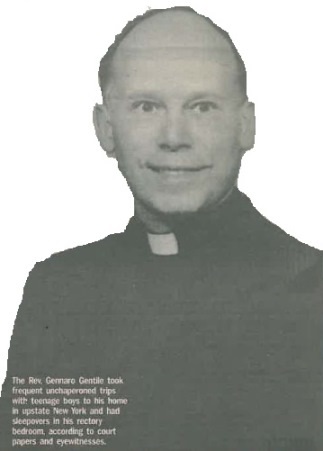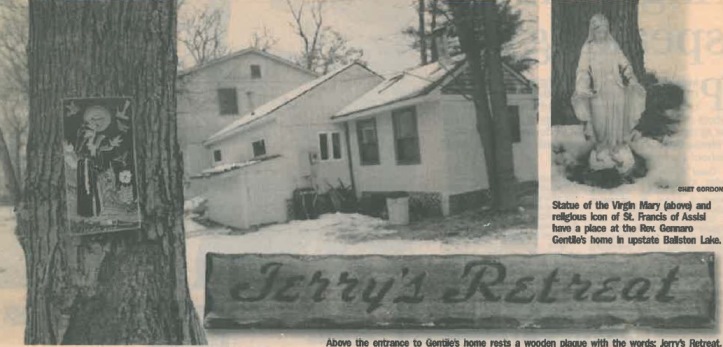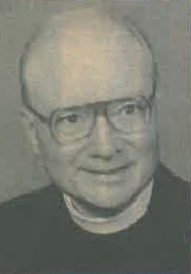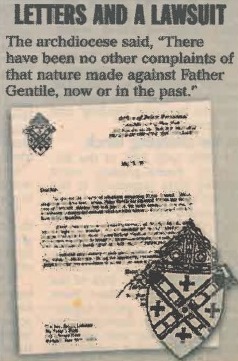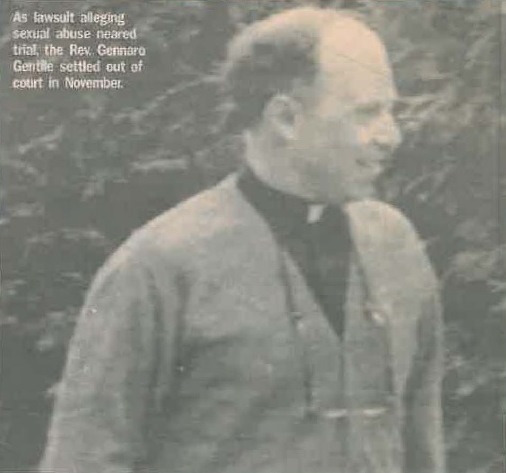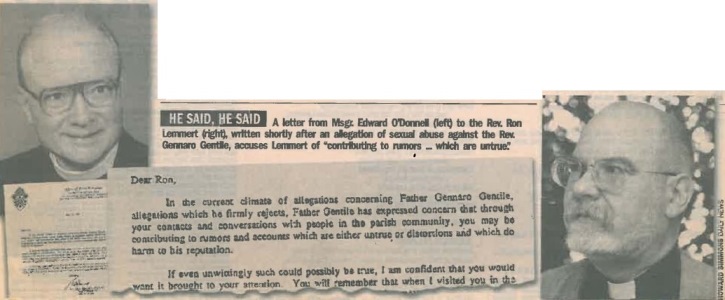Problem Priest Had Church on His Side Daily News Investigation By Heidi Evans and Richard T. Pienciak with additional research by Ellen Locker and Faigi Rosenthal [This article included a small photograph of an important letter. See a PDF of the letter from Msgr. Edward D. O'Donnell, Vice Chancellor for Priest Personnel. See also Part 1 of this series.] The Rev. Gennaro Gentile's close relationships with boys began drawing attention more than 30 years ago, but the Archdiocese of New York did little until 1997, when the parents of two teens filed a civil lawsuit accusing the priest of sexual misconduct. Even then, the archdiocese, which also was named in the lawsuit, took notice only by embarking on a campaign to defend the priest and attack the teens' family. The archdiocese sent a monsignor to Holy Name of Mary Church in Croton-on-Hudson, where Gentile was pastor, on Sept. 28, 1997, to assure parishioners at five weekend Masses that the cleric was innocent.
"I am here to express my and the archdiocese's support for him," said Msgr. Edward O'Donnell, who was then director of priest personnel for John Cardinal O'Connor. "This civil lawsuit is about money damages. There is no substance to the civil suit." In November, Patricia and Vincent Nauheimer settled their lawsuit against Gentile, now 55, who served at Holy Name from 1987 to 2000; the archdiocese had been dropped as a defendant. The couple, bound by a confidentiality agreement, declined comment. Gentile, who is known as Father Jerry, and archdiocesan spokesman Joseph Zwilling also declined comment, and O'Donnell, who is now vicar of priests for the archdiocese, failed to return several phone calls. Court documents in the Nauheimers' lawsuit, however, accuse Gentile of a pattern of sexual abuse against their sons that began in April 1993. According to the lawsuit, Gentile showed Vincent Nauheimer Jr., then 15, an erotic catalogue depicting male models "posed seductively in sexually provocative clothing." Vincent said Gentile asked him to "choose a gift for himself," but he declined. Two months later, in June 1993, Gentile took Vincent Jr. and several other boys to his five-bedroom house on Ballston Lake in Saratoga County. Gentile calls the 2-acre property "Jerry's Retreat." After complaining of sore muscles, Vincent was instructed by Gentile to remove his shirt and lay down on his stomach, according to the lawsuit. The priest straddled the boy and began massaging him with oil - all while the other boys watched a movie in the same room, the suit says. Vincent said Gentile began with his shoulders and back, then progressed down to his genitals. Embarrassed, the boy said he asked Gentile to stop, and he did. Vincent returned home from the weekend and told no one of the incident.
Nearly a year later, in April 1994, the Nauheimers accepted an offer from Gentile - then a frequent and welcome visitor - to make dinner at their home. As he prepared the meal, Gentile boasted how he had added a half bottle of hard liquor to one of the dishes. He did this fully aware that the boys' father was a recovering alcoholic, according to papers filed in the lawsuit. After dinner the family began watching a video that Gentile had brought along - "The Hobbit." At around 9 p.m., both Nauheimer parents went upstairs to put their other children to bed. That left their son, Brian, then 13, and Gentile alone in the basement family room. First, according to court papers, the priest beckoned the boy to sit closer. Then he began twirling the child's hair, and touching his ears and neck in "a sexually provocative manner." The frightened boy ran upstairs to tell his mother. The Nauheimers consulted with another priest, who said he would talk to Gentile. That priest later told the Nauheimers that Gentile had assured him it would never happen again. The Nauheimers decided to let the matter rest. But their story does not end there. Based on interviews with priests, men who say they were victimized by Gentile, parents, former and current parishioners, former co-workers and eyewitnesses, as well as sworn affidavits, other court documents, confidential correspondence and public records, here is more of the story of the Rev. Gennaro Gentile: Private counseling In August 1994, a Holy Name parishioner named Karen Mahakian asked Gentile for advice on her 14-year-old son Evan, who had been behaving erratically after his father had moved out, according to court papers. Gentile volunteered to take Evan up to Ballston Lake for the weekend to talk to the boy. They were joined for dinner at the lake house by a Holy Name deacon and his wife. The Rev. Ron Lemmert, who worked with Gentile at Holy Name and had sent an anonymous warning about the priest to the archdiocese personnel board the year before, said the deacon later told him he'd seen Gentile give the youngster liquor that night. Although he would remain silent for more than two years, Evan Mahakian eventually told the following narrative to his mother and several religious personnel at Holy Name: Alone after dinner, Gentile gave Evan more to drink. The boy recalled that he "felt high from it." Gentile told Evan he wanted to discuss his home life. With that, he took him into his bedroom and told the child he "needed a massage to relax." The priest removed Evan's shirt, applied oil to his body, took off his own shirt, then straddled the boy. Evan said the massage took place on the bed and on the floor, court papers say. Evan kept his secret, but as the months progressed he grew more troubled. He committed acts of self-mutilation, and while hospitalized in 1996, he revealed details of his night at Gentile's lake house to a therapist. The therapist wanted Evan's mom to press charges. Instead, in October 1996, Karen Mahakian reached out to Lemmert. A meeting was convened with Lemmert, the deacon, the church youth counselor and Karen Mahakian, according to court papers. It was agreed that Karen Mahakian would make a formal complaint to O'Donnell at the archdiocesan headquarters. At O'Donnell's request, Lemmert said, he wrote a three-page letter on Nov. 7, 1996, spelling out his concerns about Gentile's relationships with so many boys in the parish. He said he had grown uncomfortable with the frequent unchaperoned trips to the lake house and the boys sleeping over in Gentile's rectory bedroom. Lemmert also said he had discovered that the rectory had new cable TV service; for the first time, it included a pornography channel. In closing, Lemmert said he feared that "the number of teenage boys involved is staggering." Shortly before Thanksgiving 1996, O'Donnell convened a meeting with Karen Mahakian and her son Evan, the youth counselor and Gentile. It was agreed that Gentile would no longer take unchaperoned trips with young boys, that he would get counseling and that he would attend group therapy for sex offenders, Lemmert said he was told. But today, no one - other than Gentile and archdiocesan officials - knows whether any of the terms were fulfilled.
Lemmert's lament Uncertain that the matter had been adequately handled, Lemmert said he felt under siege. He was hospitalized for stress. He moved out of the rectory and started a job as chaplain at Sing Sing prison. But he still said Mass at Holy Name on the weekends and wanted to keep his link to the parish. O'Donnell visited Lemmert at his hospital bed and asked him "not to discuss the Mahakian matter with others." Then, on Dec. 2, 1996, Gentile wrote to Lemmert at Sing Sing informing him that his weekend services were no longer needed at Holy Name. "I would appreciate the keys back at your earliest convenience," the letter said. Two days later, Lemmert received a second missive: "I think it is inappropriate for you to attend the Saturday 5 p.m. Mass and sing in the choir. Msgr. O'Donnell also thinks it is inappropriate." Religious weekend During a weekend in March 1997, a group of Holy Name teenagers went on a religious retreat. Attendees were encouraged to discuss their problems "in an effort to help them heal," according to Brian Nauheimer, one of the weekend's youth leaders. In the lawsuit, Brian recalled that another of the attendees, Evan Mahakian, confided "that he had something that was really bothering him and asked me if he could talk to me about it." Mahakian proceeded to tell Brian of the night he had spent at Gentile's lake house - the plying with alcohol, the oil, the massage, the straddling. "Evan said that he blacked out at some point during the massage," Brian said in court papers. Evan also told Brian he had buried the incident until he underwent therapy. He said that O'Donnell had made Gentile apologize to him in return for his promise of confidentiality. At that point, Brian Nauheimer told Evan Mahakian of his own disturbing encounter with Gentile, according to court papers. More anger Brian Nauheimer was livid. He told his parents about Evan, and demanded that they take action. In an affidavit she filed in her lawsuit, Patricia Nauheimer said Evan's mother confirmed details of her son's trip to the lake house and showed her a document she described as an official report from her son's therapist. Karen Mahakian told her she had read it to O'Donnell the night of their meeting. Karen Mahakian also showed Patricia Nauheimer a letter she had received from O'Donnell discussing the situation. When Karen Mahakian complained that she did not have enough money to pay for Evan's ongoing therapy, O'Donnell said he would try to work something out, according to Lemmert. Soon thereafter, Karen Mahakian, who declined a Daily News request for an interview, stopped talking publicly about her son's trip to the lake house and his costly therapy. Sources have told The News she is bound by a confidentiality agreement with the archdiocese. But according to Patricia Nauheimer's affidavit, Karen Mahakian became enraged when she learned that the money for her son's therapy was coming from the Holy Name of Mary indigent fund.
Nauheimers get nowhere Spurred on by his son Brian, Vincent Nauheimer called Lemmert, who recommended that he call O'Donnell. The complaint went nowhere, said Lemmert. And shortly thereafter, O'Donnell summoned Lemmert to meet him at the archdiocesan seminary in Yonkers. There, Lemmert said, O'Donnell assured him that a committee was "looking into the actions of Father Gentile." But on May 13, 1997, O'Donnell wrote to Lemmert: "In the current climate of allegations concerning Father Gennaro Gentile, allegations which he firmly rejects, Father Gentile has expressed concern that through your contacts and conversations with people in the parish community, you may be contributing to rumors and accounts which are either untrue or distortions, and which do harm to his reputation."
A vigorous defense Vincent and Patricia Nauheimer filed their civil lawsuit on behalf of both sons in state court in White Plains in August 1997. By now, Vincent Jr. had told of his incidents - Gentile showing him the erotic catalogue and the oil massage at the lake house. The Nauheimers charged Gentile with civil assault and battery, intentional infliction of emotional distress and negligence. They also sued the archdiocese under the theory that Gentile worked for the church and that the archdiocese had hired him negligently and failed to properly supervise him. They sought $55 million. On Sept. 28, 1997, O'Donnell addressed Holy Name parishioners at five Masses. He said church lawyers believed the suit was "without foundation" and asked for trust in the judicial process. Several days later, Zwilling, the archdiocesan spokesman, told the Catholic New York newspaper that Gentile would continue to carry out his duties at Holy Name. The article also quoted unidentified archdiocesan officials as saying "there have been no other complaints of that nature made against Father Gentile, now or in the past."
Revised versions The Nauheimers were under intense pressure. Many of their fellow parishioners were appalled that the couple accused a priest of such behavior. The Nauheimers released an open letter to the parish, saying they filed suit only after the archdiocese "ignored us until we forced them to meet with us. After our meeting, they ignored us again and placed a gag order on Father Ron [Lemmert]. The archdiocese left us no choice." The Nauheimers offered to drop the lawsuit under two conditions: They wanted Gentile removed as pastor and they wanted the archdiocese to adopt a Megan's Law for clergy - a policy requiring that parishioners be advised of any sexual misconduct allegations against a priest made before he arrives or during his stay. O'Donnell and Zwilling were forced to make one concession, though. Many now knew of the Mahakian allegations - certainly the Nauheimers. So why had the archdiocese contended it knew of "no other complaints of that nature made against Father Gentile?" O'Donnell acknowledged to Catholic New York and The Gazette, a local weekly, that there in fact had been another incident, though he and Zwilling downplayed it. Zwilling said O'Donnell had met with Gentile and the boy's mother to discuss the priest's "interpersonal contact" with her son. "And that was that," Zwilling said. O'Donnell quoted Gentile as saying he did not consider the incident sexual, that the boy had not made a claim of sexual misconduct, and that his mother had "accepted the outcome" of the discussion. An adult eyewitness When Holy Name parishioners Peggy and Robert Ellsberg, both holding Harvard doctorates, heard about the Nauheimer lawsuit and the archdiocese's claims that it was unaware of any other sexual-abuse allegations against Gentile, they said they felt guilty and angry. In the summer of 1995, Gentile invited the Ellsbergs, then one of the parish's newest families, to Ballston Lake for the weekend. The Ellsbergs accepted, but when at the last minute, Robert said he could not attend, Gentile told him he could not allow an unchaperoned woman to spend the night at his house. The priest said he would invite others to join Peggy and the couple's 8-year-old son. In an interview, Peggy Ellsberg said the others turned out to be three teenage boys. Soon after her arrival, she said, the boys showed her son a book they'd found on "sensual massage" with pictures of naked men and women. That evening, she witnessed Gentile intensely massaging a 12-year-old boy dressed only in a bathing suit. "The kid was sitting on the arm of a couch and he was behind him," Peggy Ellsberg told The News. "It was a very dirty scene." When she tried to make light conversation, she said, Gentile appeared to be oblivious to her presence, focused solely on rubbing the boy. The next morning, Ellsberg, a professor of English at Barnard College, packed her bags and returned home. When she mentioned the incident to several parishioners, she said they told her to "'Keep it quiet. Don't tell anybody. It will ruin his career.'" She took their advice. When the Nauheimers went public, Ellsberg said she realized she had witnessed "part of a larger picture." She said she regretted her silence, and called O'Donnell, anxious to tell him what she had observed at the cottage two summers before. "He was very cool," Ellsberg recalled. "'Oh, I find it so hard to believe. Are you sure that is what you saw?'" she recalled him saying. She said O'Donnell also wondered: "'Isn't it simply the case that he is Italian?'" suggesting that Italians are physically demonstrative. "'Monsignor,' I said, 'I am Italian. And where I come from, if a man does this to a little boy, he gets shot.'" At least several Holy Name parishioners urged O'Donnell and John Cardinal O'Connor to remove Gentile from the parish and to conduct a thorough investigation. On Oct. 24, 1997, O'Connor replied to one parishioner's letter: "I have discussed the matter with Msgr. O'Donnell. I can assure you that we share your concern and we are anxious to move toward a resolution which respects the rights of all who are involved." Statute of limitations The Nauheimer lawsuit worked its way through the system. Attorneys for the archdiocese and for Gentile employed many of the same legal strategies that have made it difficult to prosecute priests on sexual misconduct across the country - most notably the argument that the statute of limitations had passed on the more serious charges involving Vincent Jr. By early 1998, only one count remained against Gentile, a charge of civil assault and battery involving the touching of Brian, which the defense took to calling hair twirling. Only one count remained against the archdiocese, too - that it had failed to properly supervise Gentile and had allowed him to continue working at Holy Name after complaints had surfaced. But the Nauheimers faced a tough challenge: They would have to prove that the archdiocese knew about Gentile's pattern of behavior before Brian's encounter with the priest in April 1994. On Sept. 15, 1999, state Supreme Court Justice Orazio Bellantoni dismissed the remaining count against the archdiocese, ruling that there was insufficient evidence to show that the archdiocese had any knowledge of Gentile's "propensity to commit the alleged acts" before April 1994. Bellantoni ordered a trial for the lone remaining count against Gentile. As the trial date neared, the priest settled with the Nauheimers in November. The terms of the deal are confidential. Gentile had already left Holy Name, and spent the summer of 2000 helping out at a parish in Rome. Within months of his return, the archdiocese sent him to fill in for a sick priest at St. Benedict's Church in the Bronx. But parishioners there quickly learned of his past. They threatened to withhold donations if he was not removed. Gentile stayed there less than two weeks. Today, Gentile works on annulments for the archdiocese at an office in the Catholic Center in Poughkeepsie. He also fills in saying weekend Mass in area parishes. Lessons learned? Peggy Ellsberg's husband, Robert, said of Gentile: "This is someone who used his status as a priest to win the trust and friendship of families, who then entrusted him with their children, and acted out his erotic attractions. You would think that the church would come down on that like a ton of bricks. Instead their only concern was legal liability." Tom McCulloch, who said in an affidavit and in an interview with The News that he was victimized by Gentile in 1973 when he was 13, offered: "They should have removed him a long time ago when these complaints started coming in." And the Rev. Richard O'Gorman, who first noticed "a problem" when he worked with Gentile in 1971, said: "Someone should have kicked him in the ass long before." Letters and a Lawsuit Patricia and Vincent Nauheimer released an open letter after they were criticized for suing Gentile and the Archdiocese of New York: "We did not want to sue. We tried not to sue. It is hard to fathom why, but the archdiocese refuses to change." [Photo Caption - Sent Packing: The Rev. Gennaro Gentile (right) who is known as Father Jerry to parishioners, sent a letter to the Rev. Ron Lemmert (left) saying his participation at Mass was inappropriate, after Lemmert warned church officials of Gentile's behavior.]
|
Any original material on these pages is copyright © BishopAccountability.org 2004. Reproduce freely with attribution.
